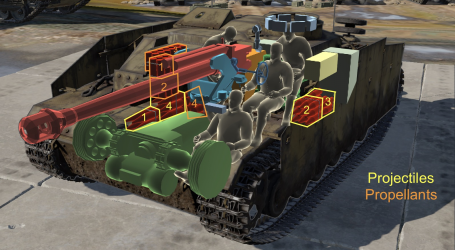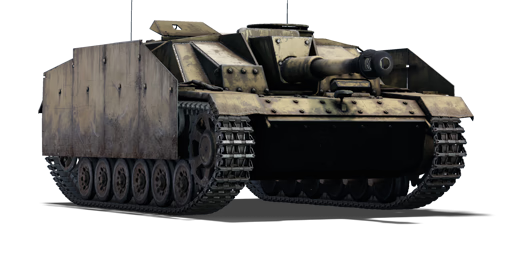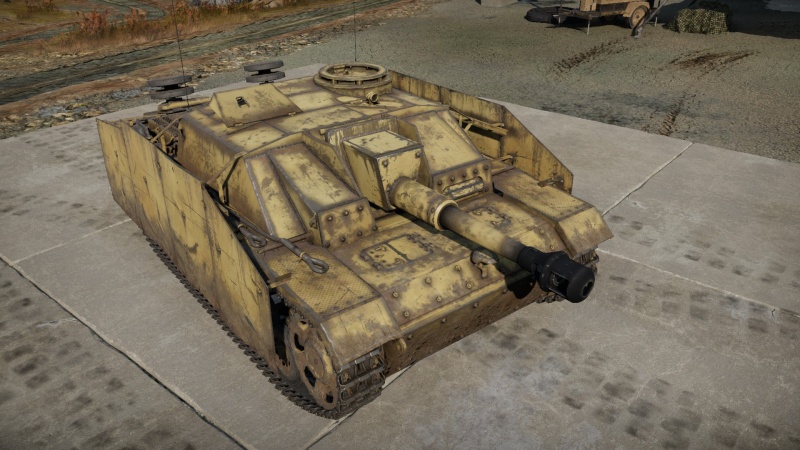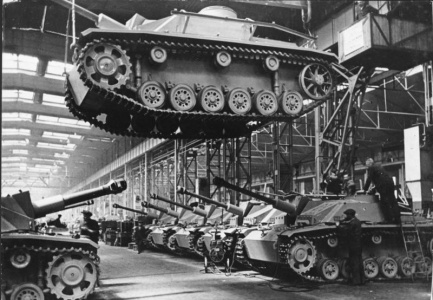Difference between revisions of "StuH 42 G"
(→Ammunition) |
Inceptor57 (talk | contribs) (→History: added a image) |
||
| Line 218: | Line 218: | ||
<!-- ''Describe the history of the creation and combat usage of the vehicle in more detail than in the introduction. If the historical reference turns out to be too long, take it to a separate article, taking a link to the article about the vehicle and adding a block "/History" (example: <nowiki>https://wiki.warthunder.com/(Vehicle-name)/History</nowiki>) and add a link to it here using the <code>main</code> template. Be sure to reference text and sources by using <code><nowiki><ref></ref></nowiki></code>, as well as adding them at the end of the article with <code><nowiki><references /></nowiki></code>. This section may also include the vehicle's dev blog entry (if applicable) and the in-game encyclopedia description (under <code><nowiki>=== In-game description ===</nowiki></code>, also if applicable).'' --> | <!-- ''Describe the history of the creation and combat usage of the vehicle in more detail than in the introduction. If the historical reference turns out to be too long, take it to a separate article, taking a link to the article about the vehicle and adding a block "/History" (example: <nowiki>https://wiki.warthunder.com/(Vehicle-name)/History</nowiki>) and add a link to it here using the <code>main</code> template. Be sure to reference text and sources by using <code><nowiki><ref></ref></nowiki></code>, as well as adding them at the end of the article with <code><nowiki><references /></nowiki></code>. This section may also include the vehicle's dev blog entry (if applicable) and the in-game encyclopedia description (under <code><nowiki>=== In-game description ===</nowiki></code>, also if applicable).'' --> | ||
===Development=== | ===Development=== | ||
| + | [[File:StuG III Production (Bundesarchiv_Bild_146-1985-100-33).jpg|right|x300px|thumb|none|The Alkett factory producing both StuG III (right) and StuH 42 (left).]] | ||
The role of a self-propelled gun came from combat experiences in World War I. During the German offensives on the Allied front, infantry lacked artillery support against fortifications in places out-ranged by their heavy artillery behind the lines. A need for a mobile artillery piece was necessary to keep up with the German infantry and fight enemy fortifications with a direct-fire assault role. The father of this concept was German General Erich von Manstein and was coined as the ''Sturmartillerie'' (assault artillery), and these units were to be embedded in infantry divisions. | The role of a self-propelled gun came from combat experiences in World War I. During the German offensives on the Allied front, infantry lacked artillery support against fortifications in places out-ranged by their heavy artillery behind the lines. A need for a mobile artillery piece was necessary to keep up with the German infantry and fight enemy fortifications with a direct-fire assault role. The father of this concept was German General Erich von Manstein and was coined as the ''Sturmartillerie'' (assault artillery), and these units were to be embedded in infantry divisions. | ||
Revision as of 13:45, 28 December 2021
Contents
Description
The Sturmhaubitze 42 Ausf. G (or just StuH 42 Ausf. G) is a rank II German tank destroyer with a battle rating of 3.0 (AB/RB/SB). It was introduced in Update 1.49 "Weapons of Victory". The StuH 42 is essentially a StuG III G with a 10.5 cm howitzer.
While the StuH 42 bears much resemblance to the StuG III F and StuG III G, its play style is much, much different. While StuG is most effective at medium to long range combat, StuH is much more suitable for close to very close range.
The reason is its gun - it is equipped with a large 10.5 cm howitzer. This gun has much lower penetration and shell velocity than that of StuG, but it can cause crippling damage with a single hit. Therefore, to be effective, StuH has to come very close to their opponents, to be able to hit their weakest parts of armour. Fortunately, its armour is reasonably good, at 80 mm, and good mobility of Panzer III chassis now becomes even more useful.
General info
Survivability and armour
Armour type:
- Rolled homogeneous armour
| Armour | Front (Slope angle) | Sides | Rear (Slope angle) | Roof |
|---|---|---|---|---|
| Hull | 30 mm (86°), 80 mm (50°) Front glacis 80 mm (19°) Lower glacis |
30 + 5 mm | 30 mm (77°) Tlop 50 mm (15-42°) Middle 50 mm Bottom |
16 mm |
| Superstructure | 80 mm (10-11°), 30 mm (50-69°) | 30 (9°) + 5 mm Left 30 (11°) + 5 mm Right |
30 mm | 11 mm |
| Armour | Sides | Roof | ||
| Cupola | 50 mm | 11 mm |
Notes:
- Suspension wheels are 15 mm thick while tracks are 20 mm thick.
- Sides of the tank are covered by additional 5 mm thick armour plates, protecting the tank against HEAT and HE shells, as well as reducing damage from nearby explosions.
- Some areas of the front armour are still only 30 mm thick. With a bit of luck they can be penetrated even by much weaker guns
- Belly armour is 30 mm thick.
Mobility
| Game Mode | Max Speed (km/h) | Weight (tons) | Engine power (horsepower) | Power-to-weight ratio (hp/ton) | ||||
|---|---|---|---|---|---|---|---|---|
| Forward | Reverse | Stock | AoA | Stock | Upgraded | Stock | Upgraded | |
| Arcade | 44 | 9 | 23.9 | 0.45 | 426 | 572 | 17.79 | 23.44 |
| Realistic | 41 | 8 | 265 | 300 | 11.06 | 12.3 | ||
Modifications and economy
Armaments
Main armament
| 105 mm StuH42 | Turret rotation speed (°/s) | Reloading rate (seconds) | |||||||||||
|---|---|---|---|---|---|---|---|---|---|---|---|---|---|
| Mode | Capacity | Vertical | Horizontal | Stabilizer | Stock | Upgraded | Full | Expert | Aced | Stock | Full | Expert | Aced |
| Arcade | 36 | -6°/+20° | ±10° | N/A | 10.6 | 14.6 | 17.8 | 19.6 | 20.9 | 13.00 | 11.50 | 10.60 | 10.00 |
| Realistic | 7.1 | 8.4 | 10.2 | 11.3 | 12.0 | ||||||||
Ammunition
- PzGr, Armour Piercing High Explosive round - It has awesome post-penetration damage but penetrates armor poorly making it, difficult to use against the front armour of most enemies, it is very good to finish off enemies from the side.
- F.H.Gr. - Can be used to great effect by skilled players but has little explosive mass compared to howitzer rounds such as the KV-2 or the Sturmpanzer II.
- Gr.39 rot Hl/B, High-Explosive Anti-Tank round - This one should be just skipped, it has no advantage over the better HI.Gr.38C.
- Gr.39 rot Hl/C, High Explosive Anti-Tank round - For begginers HEAT is a good option as it wont struggle to penetrate most tanks and will trigger hull breaks on the lightest foes and easily detonate ammo racks.
- F.H.Gr.Nb, Smoke round - Useful to blind a sight line that you want to cross or cover an escape.
Many players will ask themselves which round to main, for newer players, considering the inaccuracy of the gun HEAT is a good choice as it will penetrate most armour and is easy to use.
In order to maximize survivability bringing 12 HEAT, 5 APHE and two smoke rounds is a good idea.
| Penetration statistics | |||||||
|---|---|---|---|---|---|---|---|
| Ammunition | Type of warhead |
Penetration @ 0° Angle of Attack (mm) | |||||
| 10 m | 100 m | 500 m | 1,000 m | 1,500 m | 2,000 m | ||
| PzGr | APHE | 70 | 69 | 62 | 54 | 47 | 42 |
| F.H.Gr. | HE | 22 | 22 | 22 | 22 | 22 | 22 |
| Gr.39 rot Hl/B | HEAT | 105 | 105 | 105 | 105 | 105 | 105 |
| Gr.39 rot Hl/C | HEAT | 115 | 115 | 115 | 115 | 115 | 115 |
| Shell details | |||||||||
|---|---|---|---|---|---|---|---|---|---|
| Ammunition | Type of warhead |
Velocity (m/s) |
Projectile Mass (kg) |
Fuse delay (m) |
Fuse sensitivity (mm) |
Explosive Mass (TNT equivalent) (g) |
Ricochet | ||
| 0% | 50% | 100% | |||||||
| PzGr | APHE | 475 | 14 | 1.2 | 19 | 238 | 47° | 60° | 65° |
| F.H.Gr. | HE | 472 | 14.81 | 0 | 0.1 | 1,750 | 79° | 80° | 81° |
| Gr.39 rot Hl/B | HEAT | 495 | 12.35 | 0.05 | 0.1 | 2,530 | 62° | 69° | 73° |
| Gr.39 rot Hl/C | HEAT | 495 | 12.35 | 0.05 | 0.1 | 2,550 | 62° | 69° | 73° |
| Smoke shell characteristics | ||||||
|---|---|---|---|---|---|---|
| Ammunition | Velocity (m/s) |
Projectile Mass (kg) |
Screen radius (m) |
Screen deploy time (s) |
Screen hold time (s) |
Explosive Mass (TNT equivalent) (g) |
| F.H.Gr.Nb. | 472 | 13.9 | 20 | 5 | 25 | 50 |
Ammo racks

| Full ammo |
Ammo part |
1st rack empty |
2nd rack empty |
3rd rack empty |
Visual discrepancy |
|---|---|---|---|---|---|
| 36 | Projectiles Propellants |
25 (+11) 31 (+5) |
19 (+17) 7 (+29) |
13 (+23) 1 (+35) |
No |
Notes:
- The StuH 42 G uses two-piece ammunition, composed of projectiles (yellow) and propellant bags (orange). Both have separate racks.
- Racks disappear after you've fired all shells in the rack.
- Left side empty: 19 (+17) shells.
Usage in battles
The StuH 42 G boasts a front armour impenetrable to most enemies it encounters at its battle rating. With the Add-on armour modification, the StuH's armour is brought up to 100 mm with quite good angles. Only a few foes will manage to crack through its defences. The Sturmhaubitze 42 performs best in urban environment, where the low gun's velocity won't matter as much. The StuH can do very well as a "Heavies Killer" as its strong frontal armour will protect it against the guns carried by heavy tanks around this BR and the HEAT round will deafeat even thicker armour, making the StuH a real headache to Matilda, Churchill and KV-1 tankers. Another strategy for close-quarters engagements is to wiggle the tank from side to side while engaged in a 1-vs-1 frontal battle. This will make it more difficult for stationary enemies to hit any weak spots on the front plate as they cannot get an accurate shot off.
A very important thing to keep in mind is to never expose the StuH's weak sides to the enemy as they are only 35 mm thick (with the side skirts), so even the weakest guns and SPAAG autocannons can take you out from the side. Therefore, avoid crossing a long sightline as any enemy covering it will easily destroy the StuH 42 G with a well aimed shot at the side.
When facing a tank from the side it is recommended to aim for the engine (if HEAT is loaded) this way the enemy won't be able to flank you, then retreat into cover and load APHE and fire in the side to destroy the enemy with the massive explosive filler.
When facing a tank from the front use HEAT to disable their driver and/or transmission then aim for ammo or other crew members.
Where to shoot common foes:
- M4 Sherman - Aim for the driver first then shoot in the one of the upper corners off the front plate as that is where ammo is stored.
- T-34 - Aim for the left middle (right from your perspective) part of the front plate that will disable the gunner and driver leaving the tank completely debilitated, then shoot the other side of the UFP to disable the other two crews (a shot in the middle of the UFP will often one shot the T-34,but that depends on crew vitality).
- KV-1 - If it doesn't angle you can penetrate the front. Aim for the left side to knock out the driver then the turret cheeks are good ways of disabling turret crew.
- Enemies worth noting:
- M4A3 (105) and Su-122. Those two foes are quite similar to each other and to the StuH in multiple regards. They both have heavy calibre howitzers, firing high penetrating HEAT rounds (130 mm and 160 mm respectively) that will rip through your armour with ease. Secondly they both boast above average frontal armour, but weak sides. However the StuH can easily penetrate their armour as well , thus when facing them the winner is usually whoever gets the first shot off. It is worth mentioning that the StuH can use its side skirts against those foes, a smart StuH tanker will angle heavily, exposing the sides which will tempt most of them to take a shot at them, but the skirts will set off the sensitive HEAT fuse prematurely thus causing a Non-Pen once the HE jet reaches the actual armour, leaving the StuH a 15 or so seconds window to shoot themselves.
- Very mobile tanks e.g. M22, M3 and M5 Stuart, Crusaders, Cromwell's etc. Those can flank the StuH with ease and destroy it. Your best bet with those is to detect them as early as possible and expose your front armour, that is invulnerable to their guns.
- Russian tanks. Despite being known for their poor firepower at the BR their guns deal with angles exceptionally well, thus a shot to the heavily angled 30 mm plates above the driver's hatch will often penetrate, luckily the Add- on-Armour modification ads 20 mm of track armour, making this kind of penetration much rarer.
Achilles, Archer and M10 GMC. The former two boast the infamous British 17-pounder 76 mm gun which will rip through your armour in all places. The latter is equipped with the American M7 76 mm canon while having less penetration this gun won't pen you everywhere but it will in a lot of places, and has some HE filler increasing the damage once the shell penetrates. They all can easily be penetrated with the APHE round causing a one shot destruction because of the massive HE filler.
Counter tactics:
If your gun is too weak to deal with the StuH's front armour (which most are), and the StuH is unaware of your presence, it is best to wait for it to expose its side, then take a shot at the rear part, in order to knock out the engine - preventing them from swinging their hull around and positioning their thick front armour and fearsome 105 mm howitzer. Then it is just a matter of finishing it off: from the left side simply fire at the front/middle section, to decimate the three crew members there, thus destroying the StuH. From the right (after disabling the engine) shoot the very front upper section, hitting an ammo rack and very likely detonating it. If a head-on encounter is inevitable, aim for the driver's port, a penetration there will knock out 3 out of 4 crew members - instant destruction. However, few guns can penetrate even there so a head-on encounter should be avoided at all costs.
Pros and cons
Pros:
- HEAT won't struggle to penetrate even heavier opponents
- Very destructive APHE especially from the side
- Good mobility, especially for a tank that armoured
- Side skirts can be used to protect against HEAT/HE projectiles, very useful when attacked by a plane with rockets
- Awesome Armour, frontal penetrations are very rare.
- Good at destroying heavy tanks - which often cause a lot of trouble to weaker allies
- Quick hull traverse, very useful for a turretless tank
Cons:
- Very weak sides vulnerable to flanking
- 105 mm howitzer performance lacking compared to 75 mm StuK 40 in penetration even with HEAT
- HEAT damage lacking compared to APHE, trading off significant post-pen for penetration
- Low reload speed, maximum of 13 seconds
- Low accuracy (even at close range) makes weak spot targeting harder
- Low gun depression of -6°
- Very low shell velocity, less than 500 m/s
- If the loader dies, the vehicle's reload rate decreases dramatically and the StuH becomes rather useless in combat
- Huge ammo rack on the right side of the tank (and loader behind it) - clever players will often target this area
- Lack of a turret means reacting to flanking enemies is harder
- Cupola and machine gun shield on superstructure roof are weak points that can be targeted with HE to penetrate through the 11 mm roof top
- Difficult to climb in snow and sand
- Very difficult to target anywhere other than flat ground.
- With only a main cannon, very hard to use if loader is knocked out or if cannon is damaged
History
Development
The role of a self-propelled gun came from combat experiences in World War I. During the German offensives on the Allied front, infantry lacked artillery support against fortifications in places out-ranged by their heavy artillery behind the lines. A need for a mobile artillery piece was necessary to keep up with the German infantry and fight enemy fortifications with a direct-fire assault role. The father of this concept was German General Erich von Manstein and was coined as the Sturmartillerie (assault artillery), and these units were to be embedded in infantry divisions.
The result of this concept was a vehicle known as the StuG III, a vehicle built on the Panzer III chassis that fits the role of a support vehicle in the artillery branch. It was meant to give close support to advancing infantry against fortifications or other lightly armoured oppositions. As such, it was initially armed with a 75 mm StuK 37 L/24 howitzer. However, as World War II progressed, the appearance of newer and better tanks such as the T-34 and the KV-1 tanks forced the Germans to upgun their existing StuG IIIs in order to be able to combat these tanks. This resulted in the StuG III design being armed with a 75 mm StuK 40 L/43 and L/48 cannon in the StuG III Ausf. F and Ausf. G respectively, turning the design into something of a tank destroyer.
StuH 42 Ausf. G
The StuG III designs are now bona fide tank destroyer, but an infantry support role was still needed from these assault gun to support the advancing infantry. In 1942, some StuG III Ausf. F were equipped with the 105 mm leFH 18 howizter rather than the usual 75 mm cannons. This variant was designated the StuH 42 (Sturmhaubitze 42, or "assault howitzer") and was meant to support the infantry with heavier artillery power than the 75 mm could provide. The StuH 42 was made from the StuG III Ausf. G chassis (though the first 12 were built on refurbished StuG Fs). About 1,300 of these StuH 42 were built between March 1943 to 1945.
In-game description
A modified version of the StuG self-propelled assault mount adapted to strike undefended targets, including those beyond direct firing range. The first models of the vehicle armed with 105 mm howitzers were assembled in October, 1942, and on November 22 they were used in combat by the 185th Assault Artillery Division.
The first vehicles were based on the StuG.III Ausf.F8. However, all other vehicles were assembled on the basis of the StuG.40 Ausf.G, whose chassis was a better fit for the 105 mm howitzer. The vehicles with this modification were built at Allket's factories right up until April, 1945.
Media
- Skins
- Videos
See also
Links to the articles on the War Thunder Wiki that you think will be useful for the reader, for example:
- reference to the series of the vehicles;
- links to approximate analogues of other nations and research trees.
External links
Paste links to sources and external resources, such as:
- topic on the official game forum;
- other literature.
| Germany tank destroyers | |
|---|---|
| Pz. I Derivatives | Panzerjäger I |
| Pz. II Derivatives | 15cm sIG 33 B Sfl |
| Pz. 38(t) Derivatives | Marder III · Marder III H · Jagdpanzer 38(t) |
| Pz. III Derivatives | StuG III A · StuG III F · StuG III G · StuH 42 G |
| Pz. IV Derivatives | Jagdpanzer IV · Panzer IV/70(A) · Panzer IV/70(V) · Dicker Max · Nashorn · Brummbär · VFW |
| Pz. V Derivatives | Jagdpanther G1 · Bfw. Jagdpanther G1 |
| Pz. VI Derivatives | Sturer Emil · Elefant · Ferdinand · 38 cm Sturmmörser · Jagdtiger |
| Wheeled/Half-track | 8,8 cm Flak 37 Sfl. · Sd.Kfz.251/9 · Sd.Kfz.251/10 · Sd.Kfz.251/22 · Sd.Kfz.234/3 · Sd.Kfz.234/4 · 15 cm Pz.W.42 |
| ATGM Carrier | RakJPz 2 · RakJPz 2 (HOT) · Wiesel 1A2 |
| Other | Waffenträger · M109G · JPz 4-5 · Raketenautomat · VT1-2 |






